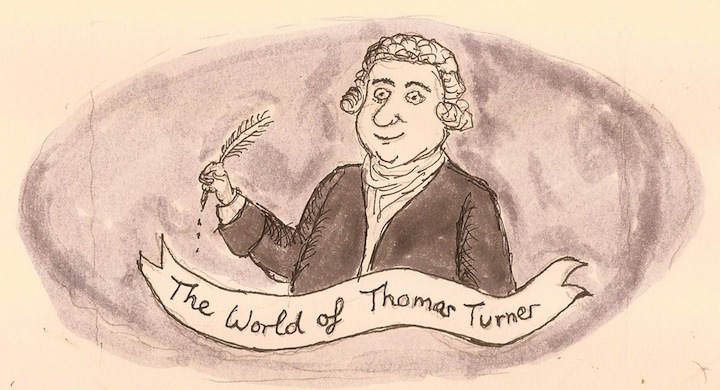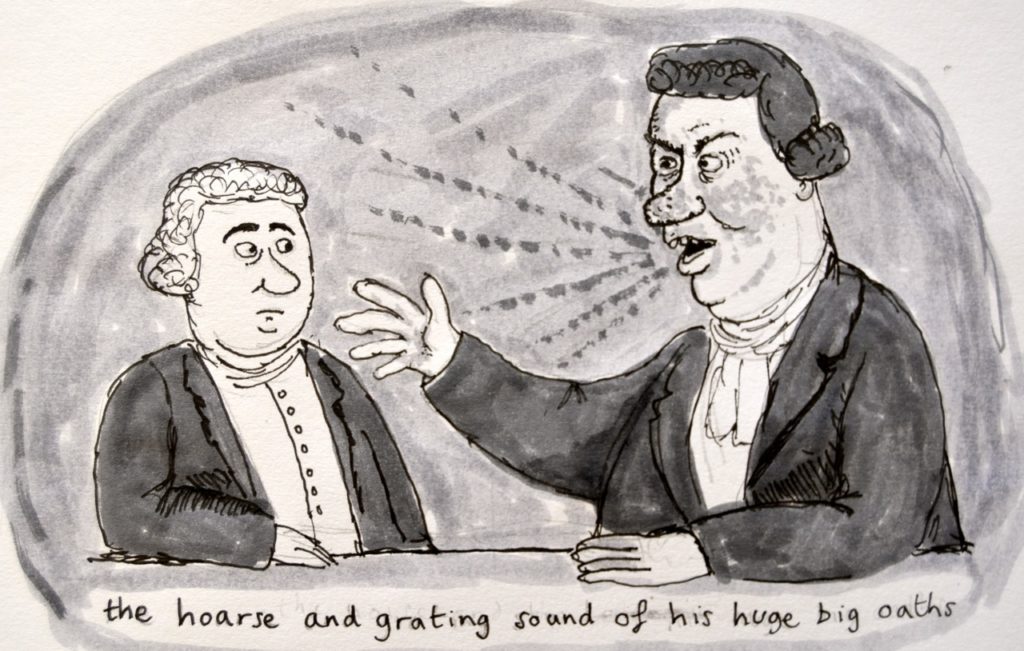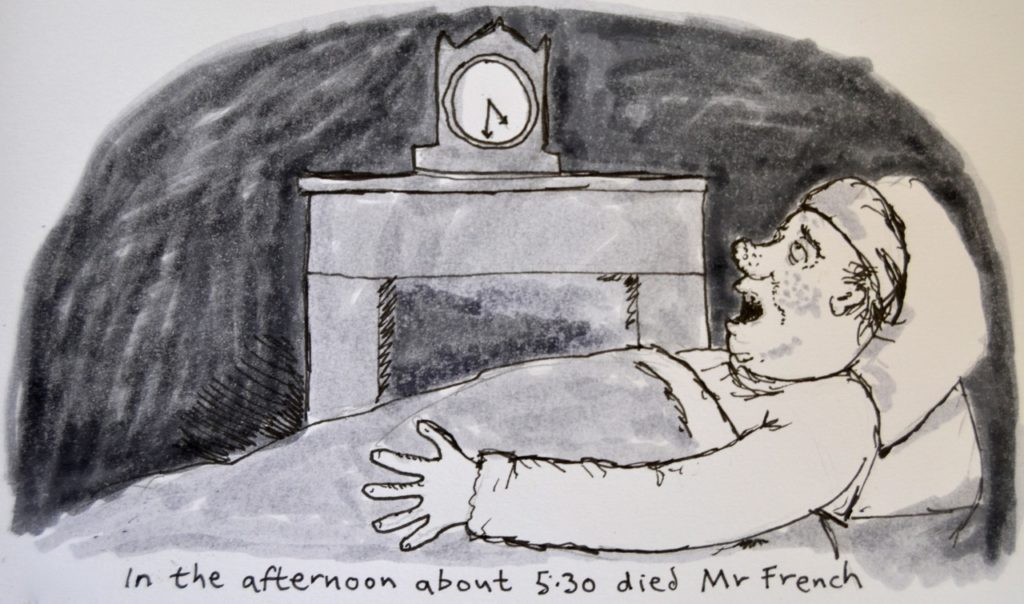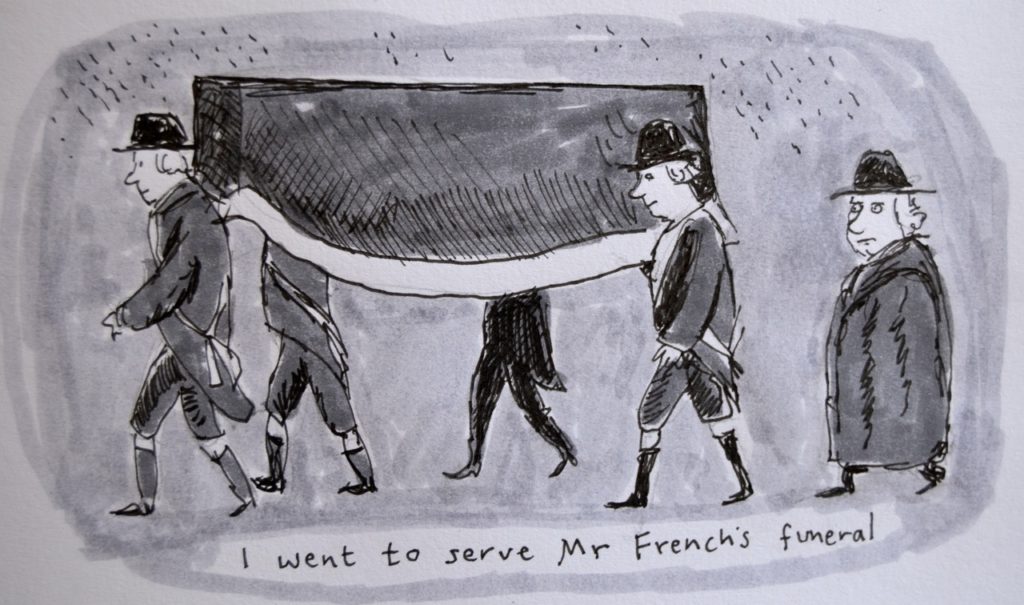A new instalment of Mathew Clayton’s monthly column exploring the daily life of a Sussex village in the middle of the 18th century, as recorded in the diary of Thomas Turner. With original illustrations by the author and artist Peter Chrisp.

Sunday 13 December 1761
‘After churchtime Tho Durrant and myself walked down to Whyly, where we stayed and spent the even, and to my eternal shame be it spoken, came home not thoroughly sober…’
Whyly was a house on edge of the village owned during Turner’s time by a larger-than-life farmer, Jeremiah French. It had been previously occupied by Thomas Lunsford, a cousin of the Pelhams – a well-to-do Sussex landowning family. In the 1630s Lunsford spectacularly fell out with his relatives after they fined him for poaching their deer. This deeply offended Lunsford, and one Sunday morning he hid behind a gravestone in East Hoathly churchyard clutching two pistols, and when his cousin appeared, shot at him. This was the start of an extraordinary series of incidents: Lunsford’s life reads like a Flashman novel. The highlights include being sent to Newgate prison for the shooting but then escaping to France where he become a colonel in the French army; coming back to England and befriending Charles 1, who pardoned him and put him in charge of the Tower of London; later being imprisoned there but managing to escape; losing an eye in battle; attacking Cromwell’s supporters with his sword in Westminster Hall; and finally fleeing to America, where he died aged 43. Loathed by the public, he was known as ‘The Roaring Lunsford’ and ‘The Cannibal Cavalier’. His cousin Lord Dorset described him as, ‘a young outlaw who neither fears God nor man’. He was also reported as being truculent and loudmouthed. Practically the same words Turner used to describe the 18thcentury occupant of Whyly – Jeremiah French. . .
Monday 1 May 1758
‘Of all the out-of-the-way quarrelsome people I ever saw, I think no-one ever came to up to Mr French. For there is no one in company must in any way the least so ever contradict what he proposes . . . He has the greatest skill imaginable in foretelling and judging right of things when they are past. For if there us is ever anything turns out to the disadvantage of the parish why then it is always his opinion that it was wrong (though perhaps at the time of its being done, one of the eagerest for it).And what renders him the more disagreeable company is that there is almost an impossibility of any person to speak a word beside himself; so the noise of his clamour with the hoarse and grating sound of his huge big oaths almost deafens the ears of any of his audience. But then the best remedy to bring him into good humour and change his perverseness into obscenity and raillery is to give 2 or 3 drams of old English gin’

Monday 5 December 1757
‘When Mr Gibbs paid me his bill, Mr `French and Tho. Fuller were in company with him; so that common civility and gratitude obliged me to ask them to walk in, which they and stayed with me until 7 o’clock. But I think nothing can be more frothy than those men’s discourse, for let us only think that they are masters of families and fathers of many children, and yet their whole discourse seems turned to obscenity, oaths, gaming and hunting’.
Turner is forever complaining about French being ‘frothy’, a word that meant shallow or empty, but they were friends of sorts. Jeremiah’s wife was godmother to one of Turner’s children. And evenings spent at Whyly were a key part of the village’s lively party scene. This night in 1758 ended at the relatively early time of one a.m. – tame for East Hoathly.
Thursday 26 January
‘About 6.30 I walked down to Mr French’s where we stayed and supped on three boiled ducks, two rabbits roasted, part of a cold loin of roasted pork, sausages, hog’s puddings and pear pie. We played at cards; my wife and I won 7 1/2d. We gave their servant 6d each; that is, 12d between us. We came home between twelve and one o’clock, and I may say quite sober considering the house we were at though undoubtedly the worst for drinking, having I believe contracted a slight impediment in my speech. Occasioned by the fumes of the liquor operating too furiously on my brain’.
Turner’s other key complaint was that French repeatedly tried to shirk his responsibility in parish matters – particularly the distribution of money to the poor. All residents of the parish had to contribute to poor collections that were then distributed to the needy. Around 30 of the 400 residents of East Hoathly received money this way. The administration of these payments were decided at vestry meetings held in the village pub. The parish was only responsible for people that had ‘settled’ in the village. Everyone that was born in East Hoathly could claim settlement but any newcomers had to show they had lived there for 40 days before they could claim a settlement certificate. They were always looking to turf out newcomers before this deadline. Children born with no father also become the responsibility of the parish and the vestry often tracked down errant fathers. The certificate men mentioned below were itinerant labourers who had settlement certificates from other parishes. They were paid less than local men.
Friday 11 December 1761
‘In the even down at Mr Porter’s a little time. This day was brought home by two men (whom our parish had sent on purpose) Will. Burrage, who had absconded above 5 years ago and left a wife and 6 small children as a burden to the parish. Now as the affair makes a great deal of noise and confusion in the place and the inhabitants seem much divided in their opinion about the treatment which he deserves to meet with. I shall for the future satisfaction of anyone who may happen to see my memoirs deliver my sentiments in the affair. First, Mr Porter, Mr Coates and Mr French are desirous he should suffer the punishment due to so atrocious a crime as deserting a family, by which means they have been an expense to the parish of upwards of £50, and the poor women became a lunatic through grief in the most rigorous manner. The rest of the people are all desirous he should escape without further punishment. Neither of which are I think agreeable to reason or justice, for as to the first I think it is too severe, as many things appearing in his favour . . . Since in custody he has behaved extreme well, giving the men no trouble, and coming home with a seeming cheerfulness, and at the same time promising to maintain and do the best for his family in his power. These things duly considered should, I presume, be some mitigation of the rigorous punishment due to his crime (which must be allowed great)’.
A further difference in the character of the two men is shown in this episode when Turner spends time searching for French’s missing servant.
Saturday 8 March 1760
‘This day a melancholy affair broke out in this neighbourhood, viz, Lucy Mott, servant to Mr Jer. French, last night absconded herself from her service (privately and quite unknown to anyone in the family) and from many corroborating circumstances there is great probability to think she hath committed that rash action of suicide. She went off in the worst apparel, and left behind here all her money, and had taken more than common care in laying up all her clothes and collecting it together in such a manner that it might be more easy to find by her relations. There is also the greatest reason imaginable to think she was pregnant. For some reasons given by her mistress it seems plain, and on the 18thult. She wanted of my wife 2 ounces jalap. But upon her saying we had not such a quantity in the house and telling her she must be mistaken in the name or the quantity, for that must be enough for 20 people to take, she seemed greatly confused and pretended it was not to take (but, however, she by fortune had none) so that I should rather think her intentions might be then rather to destroy the foetus than herself’.
Jalap was a medicine used as a laxative.
Sunday 9 March 1760
‘Before churchtime Tho Davy, Tho Durrant and myself went to seek the poor creature that is lost, but could find nothing of her. . . Tho Davy and myself searched after the poor girl again this afternoon, but found nothing of her’.
We don’t know if the three Thomas’s found Lucy, but she did reappear. In May that year Turner records her banns being read out in the village church. One can only presume she ended up marrying the man whom had got her pregnant.
French’s life wasn’t just about English gin, frothy talk and all night games of brag. As one can see from this account in 1961 child mortality was a fact of everyday day family life in the 18thcentury. . .
Thursday 10 September 1761
‘In the evening Joseph Fuller Jr and I walked down to Jones’s where I spent 6d. We came home about 8.30 . . . About noon died a little boy of Mr Porter’s (an infant of about 9 months old) and in the evening died John French (aged 18 years) after an illness of near 6 months’.
Monday 14 September
‘In the afternoon went down to Mr Porter’s and screwed down their child’s coffin. From hence I went down to Mr French’s and served their son’s funeral. Came back to Mr Porter’s and attended their child to church, and went and met the other corpse and attended that to church, and came home about 6.45. In the evening wrote my London letters’.
French’s time on this earth was also drawing to a close two years after his son’s death Turner records. . .
Saturday 17 September 1763
‘At home all day and very little to do. In the afternoon about 5.30 died Mr French of this parish after a long and lingering illness, which, it’s to be doubted, was first brought on by the too frequent use of spirituous liquors and particularly gin. If it was possible to make any estimate of the quantity he drank for several years past. I should think he could not drink less than a moderate computation of 20 gallons a year. Let me, from such instances, fly the habit of drinking and think about its final consequence’.

Wednesday 21 September
‘My brother stayed and waited the shop while I went to serve Mr French’s funeral. I served the funeral and came home about 7.20. My brother went away immediately. A very remarkable wet forenoon, it raining almost incessantly all the forenoon. Mr French was aged 55 years. An account of the gloves give away today . . . ‘
One of the stranger aspects of village life in the 18thcentury was the distribution of funeral favours – gifts given to all the attendees. In East Hoathly these were typically gloves. When there was a local death Turner was always keen to be the person to ‘serve’ the funeral. At French’s funeral Turner provided 17 pairs to be given away.
And so ended the life of Jeremiah French. Nights in East Hoathly would never be the same. And while French may have shuffled off this mortal coil it is still possible to experience the unique atmosphere of a night at Whyly. For the last 27 years it has been run as a B&B.
